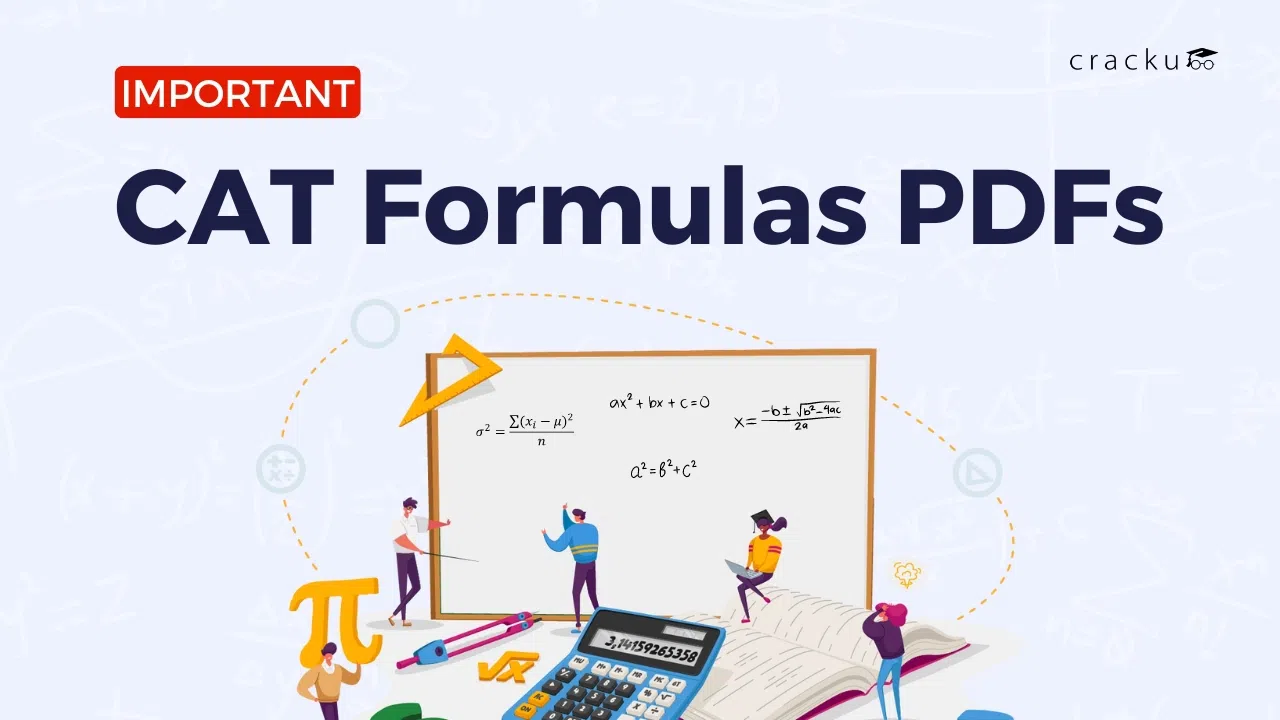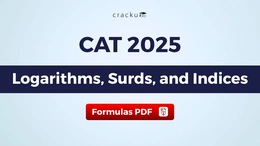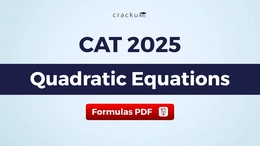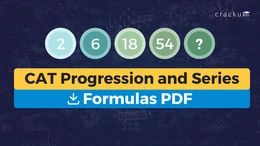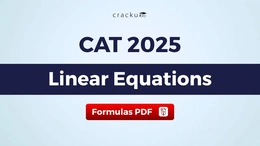MBA entrance exams like CAT look at candidate's quantitative aptitude skills, covering topics like number systems, profit and loss, LCM and HCF, time and work, averages, and more. To perform efficiently in the CAT quant section, it is important to understand the basic formulas for answering questions accurately and quickly. Cracku's CAT Formulas PDF is a useful resource that gathers all of the important CAT formulas in one place, making preparation easier and increasing chances of success in CAT.
Preparing for the CAT might be difficult, but mastering the basic formulas is important. Cracku's CAT Formulas PDF includes key formulas from Arithmetic, Algebra, Geometry, and more, helping candidates revise more effectively. In this article, we’ll discuss different CAT quant formulas, and you can also download all CAT quant formula PDFs at one place below:-
CAT Formula PDF
The following table contains all important CAT Formula PDFs in one place. Each PDF covers a specific section of the CAT Exam Syllabus, providing all the important formulas you need for effective preparation.
CAT Topic-wise Formula PDF |
CAT Formula Sheet
Here we have explained some important CAT quant formulas which will help candidates prepare for CAT Quant section effectively and efficiently, Have a look on it below:-
Geometry/Mensuration Formulas
- Area of Triangle = (1/2) × base × height
- Circumference of Circle = 2πr
- Area of Circle = πr²
- Surface Area of Sphere = 4πr²
- Volume of Sphere = (4/3)πr³
- Area of Rectangle = length × breadth
- Area of Trapezium = (1/2) × (sum of parallel sides) × height
Time, Speed, Distance, and Work Formulas
- Speed = Distance / Time
- Distance = Speed × Time
- Work Done = Efficiency × Time
- Efficiency = 1 / Time Taken
- Relative Speed = Sum of individual speeds when moving in opposite directions or difference in speeds when moving in the same direction.
Number Systems Formulas
- LCM = Product of two numbers / HCF
- Sum of first n natural numbers = n(n+1)/2
- Sum of squares of first n natural numbers = n(n+1)(2n+1)/6
- Sum of cubes of first n natural numbers = [n(n+1)/2]²
Ratio and Proportion Formulas
- Ratio = a/b, where a and b are quantities.
- Proportion = a/b = c/d, where a, b, c, d are in proportion.
- Compounded Ratio = Product of individual ratios.
Logarithms, Surds, and Indices Formulas
- log(ab) = log a + log b
- log(a/b) = log a - log b
- log(a^b) = b log a
- log(1) = 0
- logb(a) = log a / log b
- Surds: √a × √b = √(ab)
- Indices: a^m × a^n = a^(m+n)
Permutations and Combinations Formulas
- Permutation (nPr) = n! / (n-r)!
- Combination (nCr) = n! / [r!(n-r)!]
- Factorial: n! = n × (n-1) × (n-2) × ... × 1
Simple and Compound Interest Formulas
- Simple Interest (SI) = (P × R × T) / 100
- Compound Interest (CI) = P(1 + R/100)^T - P
Profit and Loss, Discount Formulas
- Profit = Selling Price (SP) - Cost Price (CP)
- Loss = Cost Price (CP) - Selling Price (SP)
- Profit Percentage = (Profit / Cost Price) × 100
- Discount = Marked Price - Selling Price
Remainder Theorem Formulas
- When a polynomial f(x) is divided by (x-a), the remainder is f(a).
- Chinese Remainder Theorem: Helps in finding the remainder when dividing by multiple numbers.
Theorem of Conditional Probability Formulas
- Conditional Probability = P(A|B) = P(A ∩ B) / P(B), where P(A ∩ B) is the probability of both A and B happening.
Set Theory and Venn Diagrams Formulas
- Union of two sets (A ∪ B) = A + B - A ∩ B
- Intersection of two sets (A ∩ B) = Common elements between A and B.
- Complement of A (A') = Total - A
Mixtures and Alligations Formulas
- Alligation Rule: (Quantity of Cheaper / Quantity of Dearer) = (Dearer Price - Mean Price) / (Mean Price - Cheaper Price)
Progressions and Series Formulas
- Arithmetic Progression (AP) nth term = an = a + (n-1) × d
- Sum of AP = Sn = n/2 × [2a + (n-1) × d]
- Geometric Progression (GP) nth term = an = a × r^(n-1)
- Sum of GP = Sn = a × (1 - r^n) / (1 - r), for r ≠ 1
Inequalities Formulas
- AM ≥ GM: The arithmetic mean is always greater than or equal to the Geometric Mean.
- Cauchy-Schwarz Inequality: (a₁² + a₂² + ... + aₙ²)(b₁² + b₂² + ... + bₙ²) ≥ (a₁b₁ + a₂b₂ + ... + aₙbₙ)²
Quadratic Equations Formulas
- Standard form of quadratic equation: ax² + bx + c = 0
- Roots formula: x = [-b ± √(b² - 4ac)] / 2a
Linear Equations Formulas
- General form of linear equation in one variable: ax + b = 0
- Linear equations in two variables: ax + by = c
Why is a CAT Formula PDF Important?
When studying for CAT exam, efficiency is important. You must solve difficult questions quickly, and having suitable formulas may help you do so. Here’s why having a CAT quant formula PDF or CAT formula sheet can make a big difference:
- Quick Revision: Instead of going through different books, the PDF gives you all the formulas in one place for fast revision,
- Better Time Management: When you know the formulas, you can solve problems faster, which is crucial in a time-limited exam like CAT.
- Enhanced Retention: Repeatedly practicing with the formulas helps improve long-term memory.
- Increased Accuracy: Knowing the basics of formulas helps you to make fewer mistakes during the exam, especially when dealing with CAT quant formulas.
Also Read, CAT CutOff 2024, All IIM's Category & Sectional Cut offs
How to Use the CAT Formula PDF Effectively
After downloading the CAT Formula PDFs, there are several ways through which we can use it much better. Here are some tips on how to use them effectively:
- Create a Formula Sheet: Use the PDFs to create a personalised CAT formula sheet of the formulas you struggle with the most.
- Daily Practice: Make a habit of revising the CAT important formulas daily to ensure they stick in your memory.
- Timed Practice: Practice solving questions with a timer, so you can get used to working quickly and accurately during the exam.
- Review Problem Areas: If there’s a particular formula or section you find difficult, go back and review it more thoroughly.
